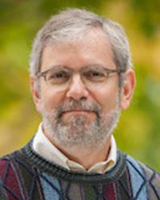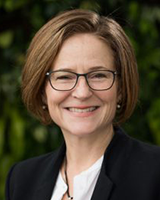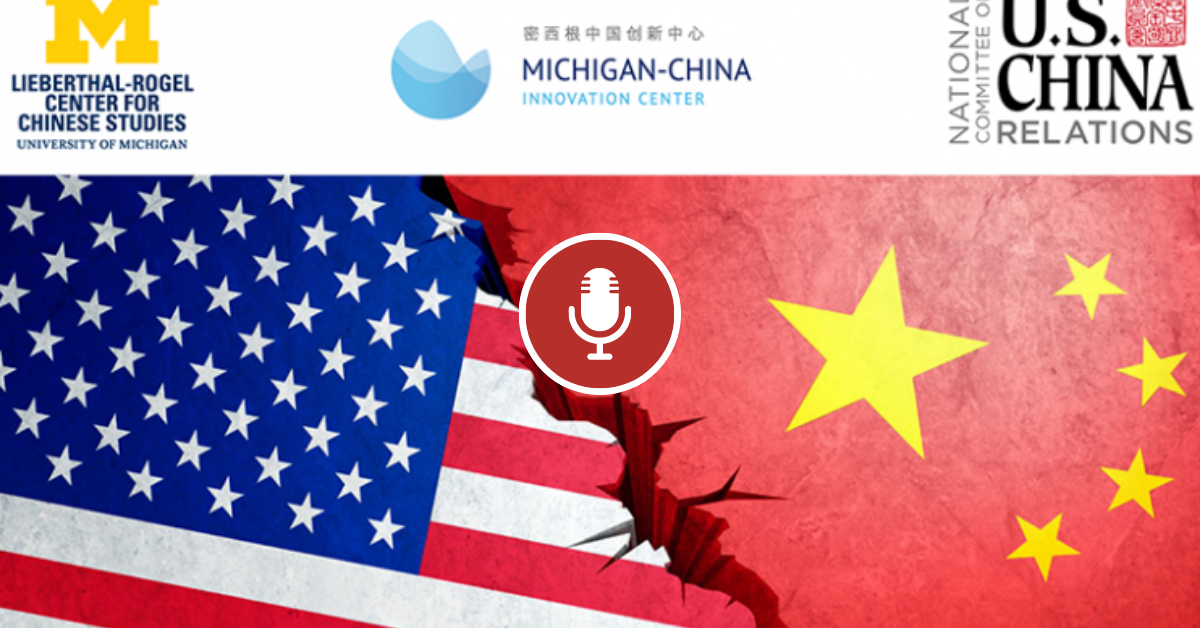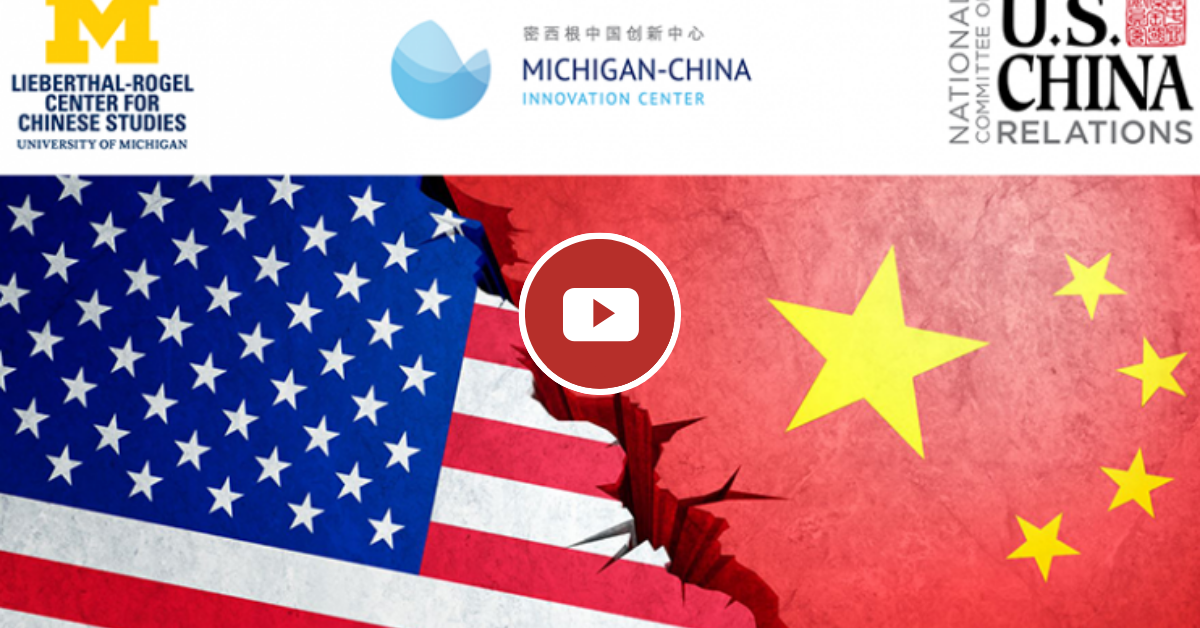Thursday, August 6, 2020 | 3:00 PM EDT - 4:15 PM EDT
Zoom webinar | Philip Bucksbaum, Bradley Farnsworth
As U.S.-China relations continue to deteriorate, two components of the relationship that have been successful in the past are increasingly coming under attack: higher education and scientific collaboration.
On August 6, 2020, the National Committee on U.S.-China Relations, Lieberthal-Rogel Center for Chinese Studies, and Michigan-China Innovation Center held the final in a series of “Bilateral Breakdown” webinars exploring U.S.-China relations through the lens of disengagement. Speakers Philip Bucksbaum, who holds several positions at Stanford University and its SLAC National Accelerator Laboratory and is also the current president of the American Physical Society, and Bradley Farnsworth, vice president of the American Council on Education, discussed the effects the downturn in U.S.-China relations is having on American innovation and competitiveness, international students and universities, and research and development. Mary Gallagher, director of the University of Michigan’s International Institute and the Amy and Alan Lowenstein Professor in Democracy, Democratization, and Human Rights, moderated the discussion.
This is the third and final program in the Bilateral Breakdown series. You can view the first program here, and the second program here.
Speakers

Philip Bucksbaum
Philip “Phil” Bucksbaum holds the Marguerite Blake Wilbur Chair in Natural Science at Stanford University, with appointments in physics, applied physics, and in photon science at the SLAC National Accelerator Laboratory. He is also the founding director of Stanford’s PULSE Institute.
Dr. Bucksbaum was born and raised in Iowa. He graduated from Harvard in 1975 and received his Ph.D. in 1980 from U.C. Berkeley. In 1981, he went to work for Bell Laboratories, moving to the University of Michigan nine years later as the Otto Laporte Collegiate Professor and then the Peter Franken University Professor. While at Michigan, Dr. Bucksbaum was the founding director of FOCUS, a National Science Foundation Physics Frontier Center, and launched the first experiments in ultrafast x-ray science at the Advanced Photon Source at Argonne National Lab. In 2006 Dr. Bucksbaum moved to Stanford and SLAC, and organized the PULSE Institute to develop research utilizing the world’s first hard x-ray free-electron laser. In addition to directing PULSE, he has served as department chair of photon science and division director for chemical science at SLAC. He currently has more than 250 publications.
Dr. Bucksbaum is the president of the American Physical Society and a former president of the Optical Society. He was elected to the National Academy of Sciences and the American Academy of Arts and Sciences, and has held Guggenheim and Miller Fellowships. He has led or participated in many professional service activities, including National Academy of Science studies, national and international boards, initiatives, lectureships and editorships.

Brad Farnsworth
Brad Farnsworth is vice president of the American Council on Education (ACE). He coordinates ACE’s global engagement strategy, which engages associations, governments, and corporations outside the United States to advance the goals of higher education globally.
From 1991 until joining ACE in early 2012, Mr. Farnsworth was director of the Center for International Business Education in the University of Michigan’s Ross Business School. The center’s programs included faculty research projects, foreign language courses, education abroad, executive development programs, and student internships. Mr. Farnsworth established strong ties between his center and the liberal arts, helping to establish a new undergraduate concentration in international studies by serving as interim director and developing and teaching one of its core courses. He also taught courses on global strategy, competing in the global economy, and business in China to MBAs, undergraduates and executives.
From 1982 to 1991, Mr. Farnsworth was associate director of the Yale-China Association. He has focused on China throughout his career, visiting the country frequently and serving as a faculty associate in the Center for Chinese Studies at the University of Michigan.
He holds master’s degrees in business and Chinese studies from Washington University in St. Louis, both awarded in 1981.
Moderator

Mary E. Gallagher
Mary E. Gallagher is the Amy and Alan Lowenstein Professor of Democracy, Democratization, and Human Rights at the University of Michigan where she is also the director of the International Institute. Professor Gallagher received her Ph.D. in politics in 2001 from Princeton University and her B.A. from Smith College in 1991. She was a foreign student in China in 1989 at Nanjing University. She also taught at the Foreign Affairs College in Beijing (1996-97) and a Fulbright Research Scholar at East China University of Politics and Law in Shanghai (2003-04). In 2012-13, she was a visiting professor at the Koguan School of Law at Shanghai Jiaotong University.
Professor Gallagher is an expert in Chinese politics, law and society, and labor politics. Her most recent book is Authoritarian Legality in China: Law, Workers and the State, published by Cambridge University Press in 2017. She is also the author or editor of several other books, including Contagious Capitalism: Globalization and the Politics of Labor in China (Princeton 2005); Chinese Justice: Civil Dispute Resolution in Contemporary China (Cambridge 2011); From Iron Rice Bowl to Informalization: Markets, Workers, and the State in a Changing China (Cornell 2011); and Contemporary Chinese Politics: New Sources, Methods, and Field Strategies (Cambridge 2010). She is the author of many articles in academic and non-academic publications, including the Washington Post, the New York Times, Comparative Political Studies, and World Politics. She is a member of the National Committee on U.S.-China Relations and has consulted for the World Bank, the U.S. departments of State and Labor, and many other NGOs and international organizations.
is the Amy and Alan Lowenstein Professor of Democracy, Democratization, and Human Rights at the University of Michigan where she is also the director of the International Institute. Professor Gallagher received her Ph.D. in politics in 2001 from Princeton University and her B.A. from Smith College in 1991. She was a foreign student in China in 1989 at Nanjing University. She also taught at the Foreign Affairs College in Beijing (1996-97) and a Fulbright Research Scholar at East China University of Politics and Law in Shanghai (2003-04). In 2012-13, she was a visiting professor at the Koguan School of Law at Shanghai Jiaotong University.
Professor Gallagher is an expert in Chinese politics, law and society, and labor politics. Her most recent book is Authoritarian Legality in China: Law, Workers and the State, published by Cambridge University Press in 2017. She is also the author or editor of several other books, including Contagious Capitalism: Globalization and the Politics of Labor in China (Princeton 2005); Chinese Justice: Civil Dispute Resolution in Contemporary China (Cambridge 2011); From Iron Rice Bowl to Informalization: Markets, Workers, and the State in a Changing China (Cornell 2011); and Contemporary Chinese Politics: New Sources, Methods, and Field Strategies (Cambridge 2010). She is the author of many articles in academic and non-academic publications, including the Washington Post, the New York Times, Comparative Political Studies, and World Politics. She is a member of the National Committee on U.S.-China Relations and has consulted for the World Bank, the U.S. departments of State and Labor, and many other NGOs and international organizations.

